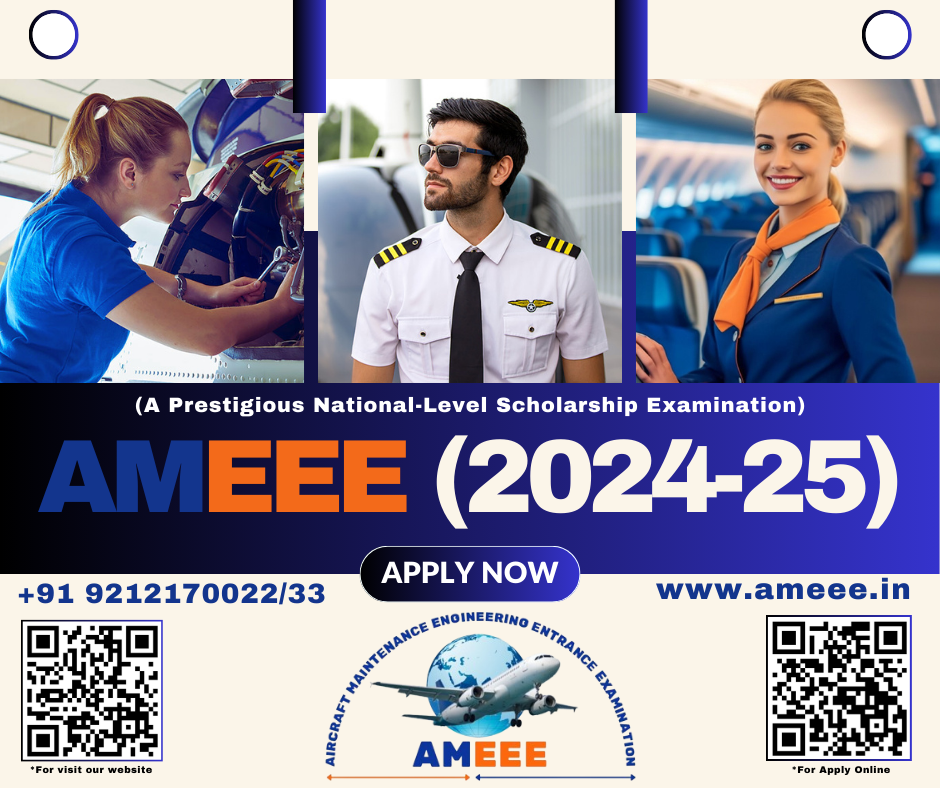In today’s fast-paced world, the aviation industry is soaring to new heights. Aircraft, a marvel of modern engineering, have revolutionized the way we travel and transport goods. Ensuring the safety, maintenance, and airworthiness of these complex flying machines is a paramount responsibility, and this is where the field of Aircraft Maintenance Engineering (AME) comes into play.
B.Tech. in Aircraft Maintenance Engineering is a prestigious and specialized undergraduate program that combines engineering principles with in-depth aviation expertise. This course equips students with the skills and knowledge required to maintain, repair, and ensure the airworthiness of aircraft, a critical aspect of aviation safety. In this comprehensive guide, we will delve into various aspects of this program, including its overview, duration, eligibility criteria, fees, admission process, course syllabus, and career prospects.
Course Overview for B.Tech in AME
B.Tech. in Aircraft Maintenance Engineering is a specialized program designed to cater to the unique needs of the aviation industry. It focuses on producing skilled professionals who can ensure the safety, integrity, and proper functioning of aircraft. As the aviation sector continues to expand, the demand for well-trained Aircraft Maintenance Engineers is on the rise. This program is tailored to provide students with both engineering and aviation knowledge, making them indispensable in the industry.
Courses Duration for B.Tech in AME
The typical duration of a B.Tech. in Aircraft Maintenance Engineering program is four years. During these four years, students undergo a rigorous curriculum that includes classroom instruction, hands-on training, and internships to gain practical experience. The duration allows students to develop a deep understanding of the subject matter and become proficient in their chosen field.
Eligibility Criteria for B.Tech in AME
To pursue B.Tech. in Aircraft Maintenance Engineering, candidates must meet specific eligibility criteria. Generally, the following conditions apply:
- Successful completion of the 10+2 (or equivalent) examination from a recognized board.
- A background in science, with Physics, Chemistry, and Mathematics (PCM) as the primary subjects.
- 3 years engineering diploma appearing or passed students.
Meeting these eligibility criteria ensures that candidates have a strong foundation in science and mathematics, which is vital for success in the aviation field. Additionally, qualifying in engineering entrance exams demonstrates a student’s aptitude for the program.
Course Fees for B.Tech in AME
The tuition fees for B.Tech. in Aircraft Maintenance Engineering can vary widely based on the institution and its reputation. On average, fees can range from INR 2 lakhs to 10 lakhs per year. It’s essential for prospective students to research and compare the fee structures of different institutions to find one that aligns with their budget and educational goals.
Admission Process for B.Tech in AME
The admission process for B.Tech. in Aircraft Maintenance Engineering typically involves several steps:
- Admission to B.Tech. in Aircraft Maintenance Engineering programs is through AME CEE entrance exams for institutions.
- Applicants are required to complete the application form.
- Upon successfully passing the AME CEE Exam, candidates will be granted admission to one of the leading B.Tech. in Aircraft Maintenance Engineering colleges, institutions or universities as per their All India Rank (AIR) in the AME CEE exam.
Syllabus for B.Tech in AME
The curriculum of B.Tech. in Aircraft Maintenance Engineering is designed to provide students with a well-rounded education in both engineering and aviation. The course syllabus typically includes the following subjects:
- Aircraft Structures and Materials: Understanding the components and materials used in aircraft design and construction.
- Aircraft Systems and Components: In-depth knowledge of aircraft systems, including propulsion, fuel, hydraulic, and electrical systems.
- Aerodynamics: Study of the principles of flight, including lift, drag, and control mechanisms.
- Aircraft Maintenance Practices: Learning about aircraft inspection, repair, and maintenance procedures.
- Aircraft Regulations and Airworthiness: An overview of aviation regulations, safety standards, and airworthiness requirements.
- Gas Turbine Engines: In-depth knowledge of aircraft engines, their components, and maintenance.
- Avionics and Electronics: Understanding aircraft avionics systems, including communication and navigation equipment.
The course syllabus is designed to provide a comprehensive education in aircraft maintenance engineering, equipping students with the knowledge and skills required to excel in the aviation industry.
Career Scope & Prospects for B.Tech in AME
B.Tech. in Aircraft Maintenance Engineering opens the door to a world of exciting career opportunities in the aviation sector. Graduates of this program are highly sought after and can pursue various roles, including:
- Aircraft Maintenance Engineer: Responsible for ensuring the airworthiness and safety of aircraft, conducting inspections, and performing repairs.
- Maintenance Planner: Involved in scheduling and planning aircraft maintenance activities, ensuring optimal operation.
- Quality Control Inspector: Ensures that all maintenance and repair work complies with safety and quality standards.
- Aircraft Technical Services Manager: Manages technical aspects of aircraft operations, including maintenance, modifications, and repairs.
- Aviation Safety Officer: Focuses on enhancing safety measures and implementing safety protocols within the aviation organization.
- Aircraft Maintenance Supervisor: Manages and supervises maintenance teams, ensuring efficiency and adherence to safety regulations.
- Aircraft Production Manager: Oversees the production and assembly of aircraft.
- Aircraft Maintenance Instructor: Trains and educates future aircraft maintenance professionals.
Opportunities for graduates are diverse, and they can find employment in airlines, maintenance, repair, and overhaul (MRO) companies, aviation organizations, and government regulatory bodies. The aviation industry continues to expand, ensuring a continuous demand for skilled professionals in aircraft maintenance engineering.

